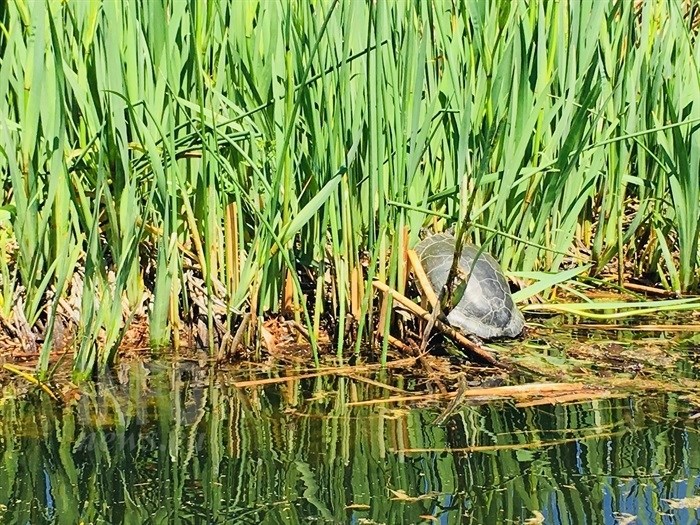
A painted turtle soaks up some rays in Kelowna.
(MARSHALL JONES / iNFOnews.ca)
June 16, 2021 - 7:00 AM
A little awareness has gone a long way when it comes to the lives of a species at risk in West Kelowna.
Earlier this year, the City of West Kelowna installed signs around the painted turtle habitat in the Rose Valley neighbourhood, with the intent of reducing motorist speed and in turn the amount of creature carnage on Westlake Road. Year after year, turtles making a migratory journey are crushed as traffic zooms through the open road.
Wade Neukomm, a longtime resident who advocates for the hard-shelled neighbours that call the space home, has taken to documenting the mortalities.
“Only three so far that I know of,” Neukomm said in an email.
“There have been several rescues by residents, the signage has definitely had a positive effect. It has also predictably angered another demographic. Those with no time in their schedule slow down for 200 meters, etc.”
Rose Valley veterinary hospital’s Dr. Moshe Oz is usually who injured turtles are taken to and he recently treated one that had been injured and re-released into its habitat.
“We would like to remind everyone to please watch out for these beautiful creatures,” he said.
While Rose Valley has been the epicentre for a lot of turtle talk in the Central Okanagan, it’s an issue across the country, prompting the Nature Conservancy of Canada to ask motorists to give turtles a break as they set off from their usual habitats to find mates and nesting sites.
In southern B.C., the extensive road network means that many turtles are struck each year as they are crossing or basking on the warm roads. The conservancy encourages motorists to slow down when they see a turtle on the road and make sure they can safely steer around it.
Turtles must survive for many years before they are able to reproduce. Many only produce eggs once a year and tend to have a very low egg survival rate. A loss of one adult turtle can mean the loss of a decade or more of turtle population development. To maintain their numbers within a population, turtles count on the survival of the adults, especially the females. Studies show that just a five per cent increase in annual mortality can put an entire population at risk of decline.
“Turtles are an important part of wetland ecosystems,” Virginia Hudson, NCC manager of conservation planning and stewardship in British Columbia said. “They play the role of the wetland janitor by helping keep wetlands clean and healthy by eating dead plants, insects and animals.”
The western painted turtle is the only native pond turtle left in the province (the Pacific pond turtle is considered extirpated, or no longer occurring, in B.C.). Western painted turtles are found in southern B.C., where development pressures have significantly altered or destroyed much of their habitat.
“Western painted turtles do happen to be among the more charming wetland creatures,” said Hudson. “It’s always uplifting to see a bunch of them sunning themselves on logs or swimming in the shallows. They are a great sign that our conservation efforts are working.”
Tips and facts
-
To help a turtle safely cross the road, first make sure the road is safe for you to pull over and help. Put your safety first.
-
Move the turtle in the direction it was going, otherwise, it will likely try to cross again.
-
For turtles that hide their heads in their shells (like a western painted turtle), simply pick the turtle up, gently holding it with both hands, supporting its belly and holding the top of its shell (the way you might hold a hamburger), and carry it across the road. Carry it close to the ground — you don’t want to drop it.
-
Once you are done moving the turtle, back away and let the turtle be to avoid causing it stress.
-
Never push or shove turtles across the road with your feet or a stick. Their shells aren't as thick underneath, and rough pavement can do a lot of damage.
-
Other threats to turtles include habitat loss, invasive species and illegal collection for the pet trade.
To contact a reporter for this story, email Kathy Michaels or call 250-718-0428 or email the editor. You can also submit photos, videos or news tips to the newsroom and be entered to win a monthly prize draw.
We welcome your comments and opinions on our stories but play nice. We won't censor or delete comments unless they contain off-topic statements or links, unnecessary vulgarity, false facts, spam or obviously fake profiles. If you have any concerns about what you see in comments, email the editor in the link above.
News from © iNFOnews, 2021